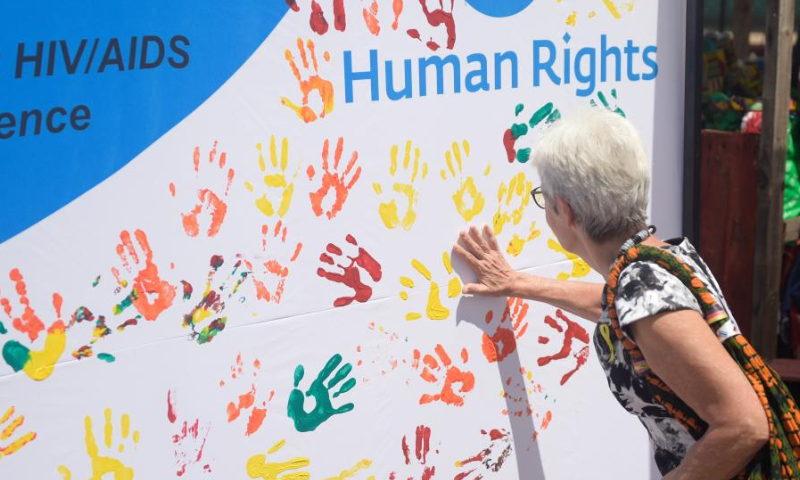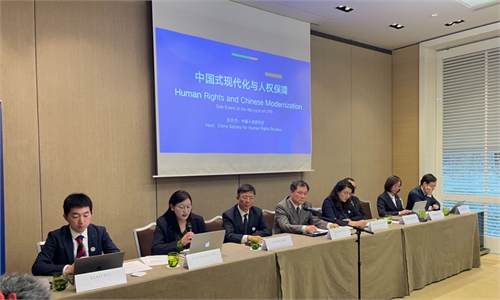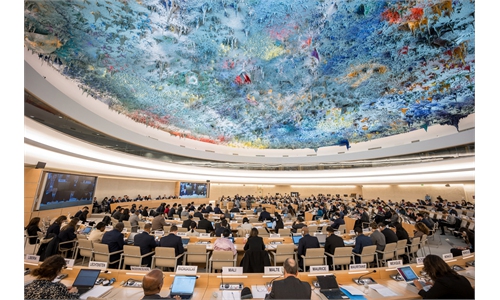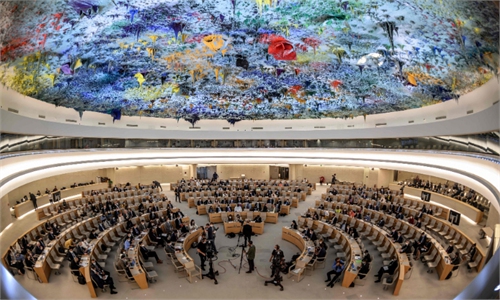China, EU kick off human rights dialogue in Chongqing
Field visit to Xizang shows sincerity, expected to help eliminating misperception: experts

A woman applies paint to a banner during a public event to commemorate the Human Rights Day in Gaborone, Botswana on Dec. 9, 2022. Human Rights Day is observed every year on Dec. 10 - the day the United Nations General Assembly adopted in 1948 the Universal Declaration of Human Rights. (Photo by Tshekiso Tebalo/Xinhua)
As the China-EU Human Rights Dialogue reportedly held on Sunday in Southwest China's Chongqing Municipality, experts said that maintaining high-level dialogue will help European countries gain a more comprehensive understanding of China's human rights achievements.
They also said that the reported field visit to Southwest China's Xizang Autonomous Region for EU officials shows China's sincerity, and that experiencing the region firsthand can play a crucial role in dispelling Europe's longstanding misjudgments and stereotypes regarding China's human rights situation.
According to the South China Morning Post on June 8, an EU spokeswoman confirmed that EU officials are set to visit Xizang this month as a side outing to their annual human-rights dialogue with China. The EU team will be led by Paola Pampaloni, the second-in-command on its Asia desk within the union's diplomatic corps.
Nabila Massrali, the bloc's foreign-affairs spokesperson, said that a side visit to Xizang was being organized by the Chinese authorities for a small group of officials from the European External Action Service who follow human rights issues, the South China Morning Post report said.
Maintaining a dialogue between both sides is beneficial for countries in Europe to have a more comprehensive understanding of the current development of human rights in China, especially its achievements, and is sure to help eliminate certain misunderstandings, Zhu Ying, a professor at the Baize Institute, Southwest University of Political Science and Law, told the Global Times on Sunday.
Zhu emphasized the importance of official communication and exchanges between China and EU in fostering relations, particularly in addressing human rights issues, as such communication carries authority and is representative.
The dialogue in the field of human rights has long been an integral part of comprehensive communication between China and Europe, Cui Hongjian, a professor at the Academy of Regional and Global Governance with Beijing Foreign Studies University, told the Global Times on Sunday.
China hopes to leverage the channel to present its views on human rights more comprehensively to the EU, allowing European countries to understand the practice of China's human rights more objectively and truthfully, Cui said, noting that China will adhere to its own position and understanding of human rights issues, as well as the experience of its human rights practice.
The last China-EU Human Rights Dialogue was held in Brussels, Belgium, in February 2023, which marked a resumption of the talks after a suspension since 2019. The EU's foreign affairs spokesperson told media that although the EU and China have different views on human rights, this is exactly why the dialogue is important.
Zhu noted that for a considerable time, some European governments and non-governmental organizations have held stereotypical views on the history and principles of human rights development in China, and these misconceptions can only be dispelled through persistent efforts to foster mutual understanding. Hence, the sustained and ongoing official dialogues between China and EU will be of great help to promote the lasting transformation of those misconceptions, Zhu said.
Regarding the field visit to Xizang organized by the Chinese side for the EU officials, analysts noted this firsthand approach is an excellent method for debunking Western misconceptions. "Even officials with preconceived biases, upon visiting the actual location, will discover that prior information was untrue. I think this is the best way for them to clarify their doubts," Zhu said.
The European side should attach importance to this opportunity for an on-site visit and recognize the sincerity demonstrated by the Chinese side, Cui said. "This more comprehensive form of dialogue and communication can greatly enhance the EU's understanding of the advancements and implementation of human rights in China."
The EU should also work to engage in more meaningful and authentic dialogue with China, as the European side, to some extent, has seen human rights dialogue as a tool or method to pressure China in the field of human rights, Cui said.
"The European side should return to the true meaning of dialogue, engage in equal dialogue with China, and adhere to the basic principle of mutual respect, rather than have a preset stance," the expert noted.
Both sides need to respect each other's practices in human rights in order for the dialogue to be not only sustainable, but also increasingly important for the stability and development of bilateral relations, analysts said.



